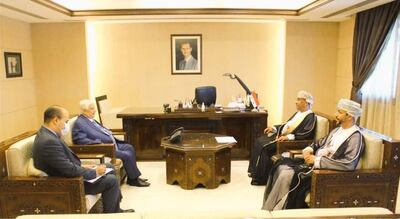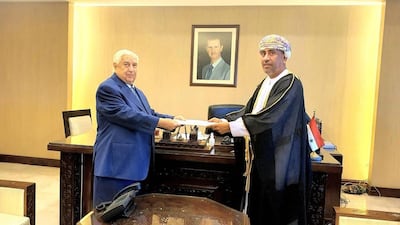Oman, one of the few Arab countries not to cut ties with Syria over the ongoing civil war, has appointed a new ambassador to the conflict-torn country.
Syria’s deputy prime minister and foreign minister, Walid Al Muallim, received the credentials of Oman’s representative Sayyid Turki Al Busaidi on Sunday.
Oman maintained ties with Syria after the 2011 uprising turned into the ongoing violent civil war, saying its role in the conflict would be to provide humanitarian support. But Mr Al Busaidi is the first ambassador of a Gulf state to actually travel to the mission in Damascus to represent the country from inside Syria since 2012. He was appointed to the post in March by royal decree.
The United Arab Emirates re-opened its mission to Damascus in late 2018 and has a charge d'affaires there. Kuwait has said it would re-open its mission in Damascus if there is an agreement at the Arab League, which suspended Syria's membership in 2011.
Mr Al Muallim and Mr Al Busaidi discussed Oman’s regional policies as well as relations between the two nations.

The reappointment of an Omani diplomat in Syria signals that Sultan Haitham will maintain the policies of his predecessor after taking power in January.
Sultan Qaboos, who led Oman from 1970 until he passed away earlier this year, was a well-known negotiator and cultivated a network of ties across the region and further afield in order to be able to channel diplomatically between sides during crises.
Read More
With a rich history and a new leader, Oman is on track for a prosperous future
Oman’s foreign minister meets Bashar Al Assad in rare Syria visit
UAE reopens embassy in Damascus after six years
Sultan Haitham, who has a lot of experience in foreign affairs, has been expected to keep Oman on the same course as a regional broker.
In 2019, former foreign minister Yusuf bin Alawi met Syrian President Bashar Al Assad and discussed ways to “restore stability to the region”. It came a year after, Damascus opened an embassy in Oman.
In nearly a decade of war, hundreds of thousands of Syrians have been killed – the vast majority by regime shelling, in government jails and through siege-and-starve tactics used by Damascus. Tens of thousands were also killed by extremist and terrorist groups such as ISIS and Al Qaeda as they gained ground over the largely secular and moderate opposition in the early years of the war.

